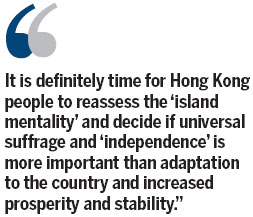Reassessing 'island mentality'
Updated: 2013-09-27 07:04
By Bill Condon(HK Edition)
|
|||||||
Coming from the island of Ireland, the third-largest in Europe with a history spanning some 8,000 years, I sympathize with the "island mentality" that is pervasive among many of the residents of Hong Kong, which seems to have grown stronger in recent years.
The notion of communities perceiving themselves as superior or exceptional to the rest of the world is based to a large degree on geographical isolation. However in the case of Hong Kong this does not apply. The sense of superiority is a reflection of a rich cultural heritage and strong traditional values that were carried across from the Chinese mainland. An innate mercantile dogma supported by a history of laissez-faire policies has over the past decade enabled Hong Kong to become a genuine world city and one of the brightest jewels in Asia, further supporting this sense of superiority.
However there are many contradictions. On one hand resides a growing sense of nationalistic pride across the territory and on the other, an increasing number of residents craving for greater political "independence" within the constitutional "One Country, Two Systems" principle. In addition the gap between rich and poor is widening with many people falling into the poverty trap and many factors hampering the quality of life for the citizens.
Since the outbreak of SARS, the bulk of the robust economic growth can be directly linked to the meteoric rise in prosperity of our cross-border neighbors. This has been the predominant catalyst in the creation of job opportunities and wealth. It has also played a key role in the massive fiscal reserve - exceeding HK$670 billion - that the government has amassed. Unfortunately they appear to be at a complete loss as to sensible ways of deploying it to improve the lives of its citizens.
However, many Hong Kong people appear somewhat detached from the reality of the predicament and underlying problems facing the city as it strives to remain relevant in the context of the mainland, the integration of the Pearl River Delta (PRD) and an increasingly competitive regional environment.
Perceived wisdom suggests that by 2020, China's economy will be the world's largest, Shanghai will have achieved its ambition to become a fully fledged international financial center and the prospect of a fully convertible renminbi is unlikely to be far behind. Likewise the planned regional economic integration of the PRD by central government will be a reality.
The integration of Hong Kong into the PRD may enhance the financial well-being of the city in key sectors, particularly those of international aviation, shipping and logistics, and undoubtedly there will be a beneficial spillover from the ultra-competitive cities that will form the increasingly energized PRD. But in reality, Hong Kong may neither be able to rely on central government generosity nor the appetite of the increasingly prosperous inhabitants of the PRD to sustain property prices and retail activity, two core economic drivers of the past decade.
The Hong Kong-Zhuhai-Macao Bridge, scheduled for completion in 2015 and expected to open to the public in early 2016, will inevitably benefit the PRD's economic development with Hong Kong being an integral element in the early stages. Faster economic integration will result from an increase in the flows of people, goods and capital. It will enhance an important regional transport network and provide a vital link, which will substantially shorten the traveling time between the eastern and western sides of the delta.
So what does this mean in reality? Some observers believe Hong Kong needs to focus on key sectors capable of driving the economy forward as a world-class city vying against an increasingly competitive mainland on one side and a growing number of dynamic Asian economies on the other.
One of the key components of a modern, successful society is an education system that matches the aspirations of its people. Hong Kong has fallen well behind in this regard. There are simply not enough university places available in the local system to meet demand. This forces many to study overseas at a high financial cost. Problems are endemic throughout the education system. Apart from highly selective band-1 schools, the majority of students simply do not receive the educational support required to enable them to fulfill their potential.
It may be time to recognize that in order for Hong Kong to achieve and maintain relevance in the new and ultra-competitive environment that is dawning, much closer integration with the central government is the best option. It is definitely time for Hong Kong people to reassess the "island mentality" and decide if universal suffrage and "independence" is more important than adaptation to the country and increased prosperity and stability.
In the case of Hong Kong, the absence of strong and trusted leadership suggests the integration of the PRD and the economic benefit that can be gained by Hong Kong in the medium to long term is more likely to dictate future direction than anything else.
The author is the founder & chairman of the Multitude Foundation; he is the also the director of the Irish Chamber of Commerce of Macau and director of the Ireland Fund of China.

(HK Edition 09/27/2013 page9)